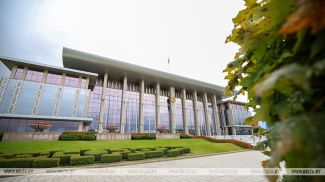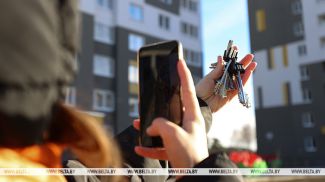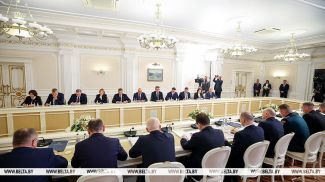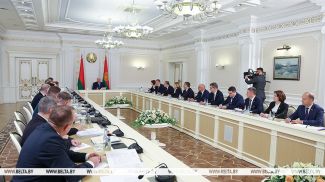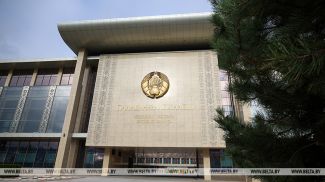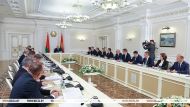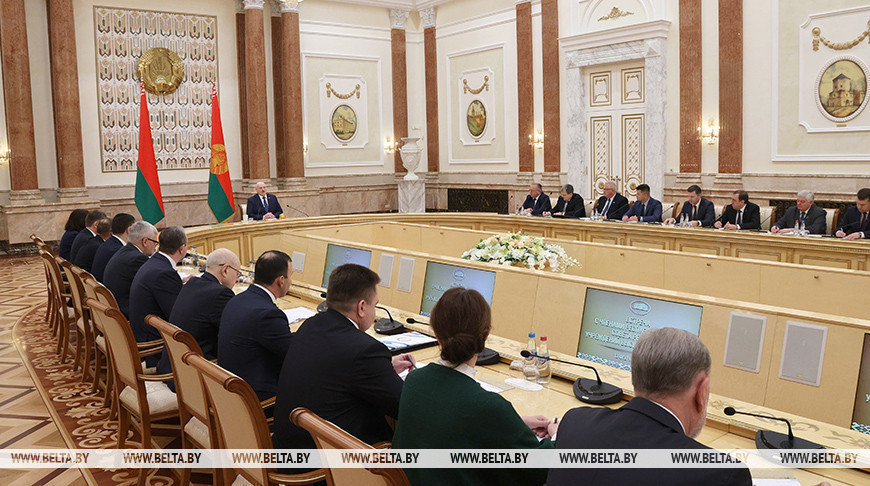
MINSK, 13 February (BelTA) – Belarusian President Aleksandr Lukashenko named five major problems of the higher education system as he met with members of the National Council of Rectors of Higher Education Institutions on 13 February, BelTA has learned.
The head of state recalled that at the meeting to discuss the BSU activities on 25 August 2023 he outlined a number of problems in the higher education system. The president asked what have been done since then to solve them and specified the most pressing problematic issues of the present day. They mostly concern the demand for and quality of national education, graduation assignment, the current state of staffing at universities, and ideological education of students.
On supply and demand for labor
Problem number one, the president outlined, is the gap between supply and demand in the labor market. “Do not train specialists that the country does not need,” Aleksandr Lukashenko warned.
“We seem to have forgotten how in the 1990s we trained hosts of lawyers and economists, who, after getting a degree, went to work as taxi drivers and pizza deliverers. Even now many graduates work outside their field of study,” the president said, adding that he had repeatedly risen the issue.
“Training specialists who later choose to work in a field unrelated to their university degree, low employee retention in the first workplace, decision on a career change – all this is an unacceptable luxury for our state. Do we have nowhere else to put our money in? If we take into account how much the state pays for it, we will see that this is nothing but an economic crime?” Aleksandr Lukashenko said.
The president asked those responsible to explain the attempts to dodge the mandatory work placement scheme, and cases of “fixed agreements” between employers and universities. “Everything looks watertight on paper. Where is your control? It turns out that you let your graduates out and forget about them. This will not do,” the head of state said. “Let me remind you that you are not businessmen, you are rectors of universities and you must think about what is best for the state.”
Aleksandr Lukashenko focused on the need to train personnel for the domestic real sector in the first place. There is still no systematic work of the ministries of economy, education, labor and social security, as well as governors, the president said. According to him, the government has not become a coordinator of the processes that are taking place in education, either.

On the demand for domestic higher education
The second problem, the president drew attention to, is the desire of school leavers to get higher education abroad. According to Aleksandr Lukashenko, there is such a trend, but the situation is no catastrophic.
The head of state asked the participants of the meeting if it was some kind of fashion or an objective choice. “They are the future elite of the state. Our state. How do you compete for them? This is a question to which I would like to hear a clear answer. Of course, they may come back, but with a completely inverted mindset,” Aleksandr Lukashenko said.
“Why BSU, BNTU, medical universities or BSUIR are not a priority for our prodigies to enter?” the head of state asked, noting that the recent polls show that such a problem exists.
The president also asked how universities cooperated with schools, how universities advertised themselves to school leavers, how they interacted with enterprises, which are the customers of personnel.
“How do you explain the shortage of personnel in demanded specialties?” Aleksandr Lukashenko said. “According to the information I have, employer-sponsored education programs do not solve the problem. Why do we have so many specialized classes if less than 30% of graduates continue their line of study?”
The meeting also focused on the quality of educational programs, including their timely update and the implementation of the latest education technologies. “I have information that almost half of students are dissatisfied with the quality of education today. Both senior students and freshmen were polled. What do you do there? You cannot keep up with technology, young specialists gain necessary knowledge when they take up their first job. We demand from the customer to guarantee the first workplace. Who needs such ‘specialists’ then?” the head of state said.
“On the other hand, if specialists do not meet the demands of enterprises, why do these enterprises not take part in the training process?” the president said. “Why do they not come to universities or take their future specialists to their assembly lines? Why do they not come to the classrooms themselves? These are questions for everyone: rectors, ministers and, above all, the government.

On rejuvenation of scientific and teaching workforce
The president stated that young people seem reluctant to go into science and teaching, and this is the third problem for the higher education system. “With such a situation in place you let highly qualified specialists go. Do not think (I am addressing the heads of universities) that there will be enough teachers to last your time,” the head of state said.
According to the president, with proper distribution of personnel and transformation of training programs, there will be no shortage of teachers, but rather, on the contrary, there will be additional personnel. This is primarily the responsibility of university rectors, who should initiate the renewal of training programs and strengthen the responsibility of teachers. “If teachers want a big salary like in the West, they should work like in the West - from morning till night (especially for young people),” Aleksandr Lukashenko said.
The head of state paid special attention to the quality of textbooks. The president said that he had recently taken a look at the philosophy textbook for university students, the one his youngest son Nikolai is using. “It is a pure nightmare!” Aleksandr Lukashenko said. “This textbook is a nonsense! Soviet textbooks gave clearly structured answers to all the questions, but this one is garbage. No student will be able to learn it.” In this regard, the head of state reiterated his demand to streamline the information given in textbooks, especially school textbooks.
The academic staff is aging, but the problem, as Aleksandr Lukashenko emphasized, is not age. “We have always cherished the experience and wisdom gained over the years. God grant many of them strength and health to share their knowledge with the youth as long as possible,” the head of state said. “What concerns me most is their worthy replacement. Who will replace us tomorrow? Especially in the specialties our country urgently needs today and has a prospect for development in the future.”
“Forget about pay rises until you introduce a new teaching methodology, new programs, new textbooks and secure enough teachers willing to work,” the head of state said. “We will find money to pay you, but we need quality results. Start working right away. You know the most modern samples and levels of education. Make your universities better. This is what the Year of Quality is about.”
The president added that the situation with the teaching staff in higher education is not critical, yet it is alarming in certain areas, primarily in technical education. Therefore, the head of state expects proposals on the above-mentioned issues from all those responsible.
The head of state’s priority demand is to rule out complacency. “This applies to everyone and across all areas,” Aleksandr Lukashenko said.
According to him, there is a need to secure revision in certain areas of higher education. The president addressed a number of questions to Chairman of the Higher Attestation Commission Aleksandr Guchok, regarding the relevance of the topics of candidate's and doctoral theses.
On the link between education and politics
“Education has never been outside politics. You do not just give a profession, you shape the worldview of young people,” the president said drawing attention to the next problem in the higher education system. “I will put it straight: you are responsible for national security and the country's sovereignty in the first place. If you still employ people who do not share our approaches and our policy, our state ideology, if you employ yesterday's fighters against the ‘regime’, what conclusions should I draw about you? This is a question for reflection and appropriate decision-making.”
“We saw your students, with minds clouded with Western values, in the country’s squares in 2020. Many 'meanings' that brought them to the streets were put in them in your classrooms, unfortunately,” the head of state added.
On ideological education of young people
Aleksandr Lukashenko sees the lack of ideological and morale building activities aimed at young people as the fifth problem for the higher education system. In his respect the president has questions for higher education institutions, the Education Ministry, the government, the Belarus President Administration and youth organizations.

“What can we talk about if individual teachers, to put it mildly, are not models of patriotism themselves. What can we demand from students if, for example, a professor cannot or does not want to competently answer complex life and political questions?” the head of state asked a rhetorical question. “In this situation, no concerts, no show programs or flash mobs will teach children to sincerely love their homeland, respect the older generation, and cherish the historical truth.”
According to the president, there are no events at the level of higher education institutions that would be able to unite young people.
Those responsible for higher education often focus on statistics and self-reports, the head of state said. For example, Education Minister Andrei Ivanets has not yet proposed a candidate for the post of Deputy Ideology Minister, although it was opened at his request in November 2023.
“We will put forward candidates in the shortest time possible,” the minister said.
The president said that the meeting was not going to be an easy walk: “I warn all those who wanted to speak: we do not need self-reports, narcissism, outstanding ‘achievements’. Here is the Council of Rectors, which should propose further ways to improve our education.” Especially since the main areas to other levels of education (in particular, pre-school and school, enrollment system) have already been determined. “We have already taken a look at kindergartens: there are enough problems there, but we know what to do. We have also dealt with schools, entrance exams. Now it is time for universities,” the head of state emphasized.
The president instructed to set up a working group to study the situation in the education system by analogy with the working group for the healthcare system. “We need to set up a working group for universities as we did in healthcare. The universities are in need of impetus. They have stuck in the old practices, haven’t they,” the head of state said addressing Education Minister Andrei Ivanets. First of all, the president urged to pay attention to the content and quality of the curricula and to consider the possibility of reducing the training time for certain specialties: “The working group will look into what programs can be reduced and will suggest renewed curricula for them. Maybe three and four years will be enough instead of five or four years.”
“Before 1 September, we must clearly define how we will proceed. If such a need arises (and probably it will), we will meet in late August to hear the reports of the working group after it inspected the situation in all the universities. This will be similar to the work we did in healthcare. We will sum up the results and draw conclusions about how we proceed,” Aleksandr Lukashenko said.
Addressing the rectors, the president emphasized: “You are the intellectual pool of the country. Hundreds of thousands of young people are in your hands. You are responsible for each of them. I made a decision to create the National Council of Rectors with such broad powers not to turn it into some kind of discussion, formal-bureaucratic club. You were supposed to become a locomotive for the development of the higher education system in the country.”
As it has been reported, in 2023, Belarus has carried an inspection of the healthcare system. An interdepartmental working group was set up on the instruction of the president. The group included not government officials, but specialists with the necessary qualifications and sufficient practical experience. They inspected healthcare institutions of different levels in different regions of the country and presented the report to the head of state identifying the shortcomings and suggesting ways to solve them.




